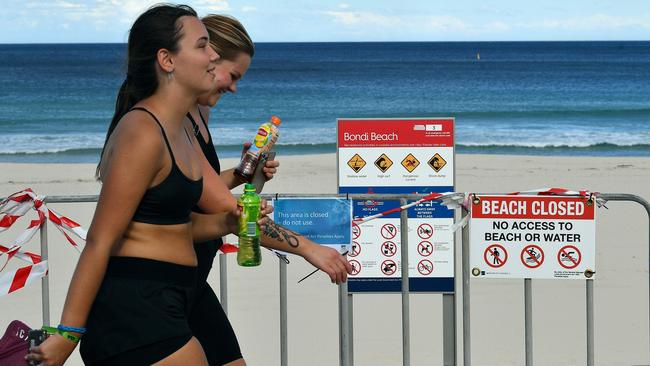If you’re under 60, and in good health, crossing the road is more dangerous than COVID-19
Economists demanding a harder lockdown should seek 3.6 million second opinions.

The impact of COVID-19 on gender equality caught the attention of a group of US economists this month. “The pandemic will have a disproportionate negative effect on women and their employment opportunities,” they wrote for the National Bureau of Economic Research.
Devastated hospitality and retail sectors are dominated by women, and childcare centres have closed so “parents have no choice but to watch their kids themselves”. Grandparents and neighbours aren’t available because of social distancing. “Mothers are likely to be more affected than fathers,” they said.
Nonetheless, grandfathers appear to be shouldering more of the burden than grandmothers — by dying in droves. In Italy, for instance, the virus has killed more than twice as many men despite there being more women.
On a brighter note, COVID-19 “may erode social norms that currently lead to a lopsided distribution of the division of labour in housework and childcare”. With more men working from home, they’ll be getting used to changing nappies and helping with the homework as women dominate nursing and other frontline health roles.
If you found this analysis silly, it’s because there are too many economists in the world, not because they aren’t doing their job. The four authors from top US and German universities are looking at data, making inferences and weighing up how costs of the virus fall on different groups in quality-of-life terms.
That contrasts with a bizarre “open letter” to the Australian government, signed by more than 100 economists, that calls the trade-off between health and economic outcomes a “false distinction”, urging hard lockdowns until the coronavirus can be “comprehensively addressed”.
What might the 3.6 million Australians who may soon be out of work as a direct result of government regulations, according to a new report by the Grattan Institute, make of the “false distinction”? The lockdown might be considerably shorter if those calling for it, including the professors, had to take a large pay cut until it was lifted.
As Mervyn King, former governor of the Bank of England, said on Monday, governments were doing “enormous damage” and must acknowledge restrictions would have to be lifted even in the face of potentially higher death rates. Trade-offs are Economics 101. To stay locked down until a vaccine emerges, or until we “eradicate” the virus, was farcical, King suggested.
Charles Goodhart, one of the world’s top monetary economists of his generation, said late last month that from a strictly income-maximising point of view “let it rip” made sense.
“Given the age and frailty of those likely to die, this increased death toll in 2020 would have been almost entirely offset by sharply lower death tolls over the subsequent decade,” said Goodhart, himself in his 80s. “While one should keep such an analysis in mind, such a cold-hearted policy would have been morally wrong, and socially and politically entirely unacceptable,” he added.
Indeed, cautious easing of restrictions — which is happening in Europe — is all anyone could advocate in the circumstances. COVID-19 can prompt many deaths and overwhelm health systems.
“The measures put in place in Australia, at the border and within the states and territories, have reduced the number of new infections,” the open letter said, with no evidence. Some probably have, but we don’t know yet which social-distancing measures are effective.
Simply because A follows B doesn’t mean A caused B. Australia’s weather, relative population density or island geography may play a role in our relative success too. We don’t know. The passage of the virus in Sweden, Japan and Taiwan, which haven’t locked down, is markedly better than in Italy and Spain, which did.
Certainly, the benefits of shutting down schools is debatable, unlike the terrific inconvenience it has caused millions of families.
Banning individuals sitting on a park bench, playing golf or meeting any more than one other person may well be seen in time as excessive once considered studies emerge. Certainly, governments didn’t go this far a century ago when dealing with a far worse disease.
If you’re under 60, and in good health, crossing the road is more dangerous than COVID-19. And even if you’re over 60, you may not even want to see the economy trashed while you are isolated from your children and grandchildren for months. Maybe you’d prefer to take the risk.
The death of a 93-year-old in a nursing home has become a daily national news story. Every death is a tragedy, but government policy should be guided by evidence, not emotion.
“Could the images of people dying on stretchers in tents in hospital parking lots be blinding us to the greater harm we may be causing across society through our efforts to avoid those awful deaths?” asked one of our top philosophers, Peter Singer.
It’s looking less like we’re facing the once-in-a-century Spanish flu-type virus we all feared, which justified draconian measures in the first place. And studies in California and Germany are finding more people have the virus without symptoms than first thought.
About 60 million people die each year and coronavirus has claimed 165,000, many of whom were elderly and unwell and might have died soon in any case.
India and Indonesia remain the big unknowns. These two poor countries endured the brunt of the Spanish flu, losing respectively 5 per cent and 3 per cent of their total populations, the equivalent of more than 70 million people today. As of Monday it is estimated COVID-19 had killed about 1200 people across both countries, which is tentatively reassuring.
In defiance of the professors, Sydney’s Randwick council on Monday reopened its beaches for exercise. The impact on gender equality is yet to be determined, but surely it is a sideshow.





